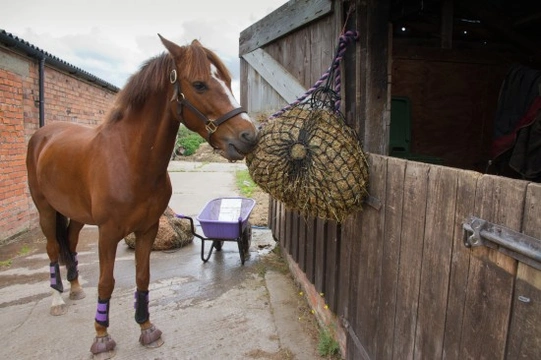
Reasons Why Horses Can Go Off Their Feed
Recent studies have shown that nutrition plays a key role in how quickly a sick horse recovers from an injury or illness. There are certain feeds and forages which will prove really beneficial whereas others should be best avoided. In short, it's important to know which feeds are good and which are bad to give horses when they sick or in recovery.
One of the most challenging things is tempting a sick horse into eating because a lot of the time they lose their appetites when they are sick or recovering from some form of illness. However, some conditions and illnesses horses suffer from can really benefit from well planned and careful diet management.
Establishing Why a Horse Won't Eat
There could be several reasons why a horse refuses to eat or when they show no interest in food or hay whatsoever which includes the following:
Fever
When horses develop a fever that's over 101.5°F, all too often they go off their feed. If the fever continues to rise, they will refuse to eat anything at all. However, as soon as the fever breaks and their temperature starts to come down, horses soon start eating again. Horses are typically given NSAIDs to bring down a fever but it's crucial that a vet be able to find the root cause of their condition so they can be correctly treated.
Gastrointestinal Disorders
Horses that suffer colic, impactions and enteroliths which are intestinal stones or are on the verge of suffering from a bout of diarrhoea, will often prefer not to eat anything. The vet would be able to establish if this is the case by examining the horse and carrying out specific tests.
Respiratory Issues
In much the same as when a horse is experiencing some sort of gastrointestinal disorder, when they develop a respiratory problem they tend to go off their food and more especially if they are suffering from some sort of viral or bacterial infection.
Gastric Ulcers
Horses suffering from gastric ulcers will tend not to want to eat although vets cannot make the connection of whether it is because of the ulcers. As such they tend to think the fact a horse is off their feed and suffering from gastric ulcers could just be coincidental.
Antibiotics
Some horses when they are on antibiotics and more notably metronidazole, will go off their feed because the drug has a nasty taste and is very unpalatable.
Dental Disease
One of the main reasons why older horses go off their feed and therefore loose condition is because they are more prone to suffering from dental disease. Having painful teeth makes it very difficult for them to chew and eat.
Colon Acidosis
When horses are fed an incorrect diet that contains too much starch with not enough fibre and forage, they can develop a condition called colon acidosis. This is when far too much acidity builds up in their large intestine/colon. If this happens, all too often the horse may refuse to eat. The best solution is to ensure a horse is given adequate forage and to turn them out on grass which should encourage them to eat again.
First Goal is to Get a Horse to Eat Again
The first goal is to get a sick or recovering horse to eat again so they maintain condition. Horses may need to be fed a diet that is less than an ideal choice in order to do so, but as long as it gets them interested in their food that's all that matters at this stage of the game.
Feeding alfalfa hay instead of grass could be one solution but it really does depend on how picky an eater the horse happens to be. The vet would recommend the best way to get a horse to eat again so it's crucial to listen and follow their advice.
Making Sure Sick Horses Drink Enough Water
It's also crucial that sick or recovering horses drink enough fresh clean water. If you notice that your horse is not drinking enough, some vets recommend that you put a couple of ounces of salt in their feed which may help encourage them to drink more. It's also a good idea to supplement their diet with omega-3 fatty acids which are useful when it comes to reducing any kidney inflammation.
Conclusion
When horses go off their food it can be a very worrying time for owners. A horse that has an obvious illness is a lot easier to treat, but a horse that refuses to eat for no apparent reason could be a lot trickier to sort out. A vet would want to carry out a full examination of a horse and also check out their environment to establish just why they are off their feed before recommending the best way forward in getting them to tuck into their food again.



